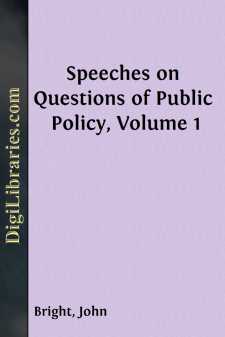Categories
- Antiques & Collectibles 13
- Architecture 36
- Art 48
- Bibles 22
- Biography & Autobiography 813
- Body, Mind & Spirit 142
- Business & Economics 28
- Children's Books 17
- Children's Fiction 14
- Computers 4
- Cooking 94
- Crafts & Hobbies 4
- Drama 346
- Education 46
- Family & Relationships 57
- Fiction 11829
- Games 19
- Gardening 17
- Health & Fitness 34
- History 1377
- House & Home 1
- Humor 147
- Juvenile Fiction 1873
- Juvenile Nonfiction 202
- Language Arts & Disciplines 88
- Law 16
- Literary Collections 686
- Literary Criticism 179
- Mathematics 13
- Medical 41
- Music 40
- Nature 179
- Non-Classifiable 1768
- Performing Arts 7
- Periodicals 1453
- Philosophy 64
- Photography 2
- Poetry 896
- Political Science 203
- Psychology 42
- Reference 154
- Religion 513
- Science 126
- Self-Help 84
- Social Science 81
- Sports & Recreation 34
- Study Aids 3
- Technology & Engineering 59
- Transportation 23
- Travel 463
- True Crime 29
Speeches on Questions of Public Policy, Volume 1
by: John Bright
Description:
Excerpt
PREFACE.
The speeches which have been selected for publication in these volumes possess a value, as examples of the art of public speaking, which no person will be likely to underrate. Those who may differ from Mr. Bright's theory of the public good will have no difficulty in acknowledging the clearness of his diction, the skill with which he arranges his arguments, the vigour of his style, the persuasiveness of his reasoning, and above all, the perfect candour and sincerity with which he expresses his political convictions.
It seems likely that the course of events in this country will lead those, who may desire to possess influence in the conduct of public affairs, to study the art of public speaking. If so, nothing which can be found in English literature will aid the aspirant after this great faculty more than the careful and reiterated perusal of the speeches contained in these volumes. Tried indeed by the effect produced upon any audience by their easy flow and perfect clearness, or analysed by any of those systems of criticism which under the name of 'rhetoric' have been saved to us from the learning of the ancient world, these speeches would be admitted to satisfy either process.
This is not the occasion on which to point out the causes which confer so great an artistic value on these compositions; which give them now, and will give them hereafter, so high a place in English literature. At the present time nearly a hundred millions of the earth's inhabitants speak the English tongue. A century hence, and it will probably be the speech of nearly half the inhabitants of the globe. I think that no master of that language will occupy a loftier position than Mr. Bright; that no speaker will teach with greater exactness the noblest and rarest of the social arts, the art of clear and persuasive exposition. But before this art can be attained (so said the greatest critic that the world has known), it is necessary that the speaker should secure the sympathies of his audience, should convince them of his statesmanship, should show that he is free from any taint of self-interest or dissimulation. These conditions of public trust still form, as heretofore, in every country of free thought and free speech, the foundation of a good reputation and of personal influence. It is with the fact that such are the characteristics of my friend's eloquence, that I have been strongly impressed in collecting and editing the materials of these volumes.
Since the days of those men of renown who lived through the first half of the seventeenth century, when the liveliest religious feeling was joined to the loftiest patriotism, and men laboured for their conscience and their country, England has witnessed no political career like that of Cobden and Bright. Cobden's death was a great loss to his country, for it occurred at a time when England could ill spare a conscientious statesman. Nations, however, cannot be saved by the virtues, nor need they be lost by the vices, of their public men....


